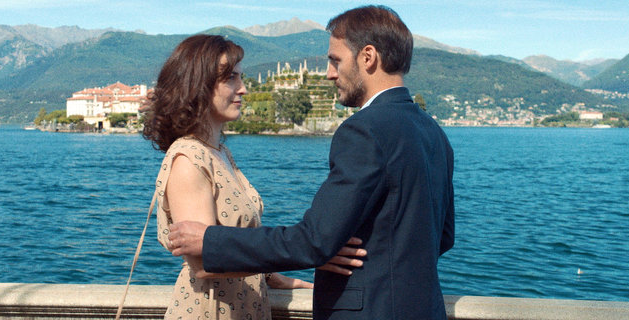Somewhere between beauty and knowledge lies “la sapienza,” or sapience a.k.a. great wisdom and sound judgment for those unfamiliar with the semi-archaic term. It is also, incidentally, the name of a Catholic church called Sant’Ivo alla Sapienza, built by renowned architect Francesco Borromini, who serves as a character of his own in Eugène Green’s La Sapienza.

After respected French architect Alexandre Schmidt (Fabrizio Rongione) receives a lifetime achievement award for his work, at which his wife, Aliénor Schmidt (Christelle Prot Landman), is in attendance, he begins to feel as though his projects have been meaningless in trying to convey what he has truly wanted to–that he has generally failed to connect with those who must occupy his buildings.

The latest project he’s working on is called into question by the suits with the money, and he is given a two-month period to revise it to better fit with the demands of the budget. With his marriage already in tatters, this news prompts him to take a trip to Italy for inspiration. Aliénor, needing a break from her own often depression-inducing career (she is a psychological appraiser of low-income demographics in France), asks if she can go with him. Alexandre, of course, agrees and the two head to Stresa, a town in the Piedmont region where Alexandre plans to get the inspiration he needs to write a book about Borromini.

While there, the two encounter a brother and sister named Goffredo (Ludovico Succio) and Lavinia (Arianna Nastro), during a walk along the shore. Lavinia becomes faint, concerning Aliénor greatly, as she has a sort of empathic way about her. Alexandre and Aliénor offer to take Goffredo and Lavinia back to their home in a taxi so that Lavinia doesn’t further exert herself.

After the debacle, Aliénor becomes greatly invested in Lavinia’s recovery, insisting that Alexandre embarks on the rest of their journey with Goffredo, a soon-to-be architecture student in Venice, as his companion. Surprised by the idea, yet not completely averse to it, Goffredo concedes.
And so, Aliénor stays in Stresa to oversee the progress of Lavinia’s recovery. The two enjoy one another’s company immensely, especially Lavinia, who enjoys practicing her French with Aliénor. They often discuss weighty subject matters, including Aliénor’s view on what the key to happiness is in most social groups. Aliénor maintains that those who are rich are happy and those who are poor are not. Lavinia then points out that in the book she’s reading, Madame Bovary, Emma is rich, but very unhappy. Aliénor admits that there are always exceptions to the rule.

Meanwhile, Alexandre’s stoicism proves no match for Goffredo’s endless patience and eagerness to learn. Green’s drawn out shots of each character’s blank face serve to accent the dichotomous state of minimalism and grandiosity that exists in both the architecture around them and within the characters themselves. As the bond between Alexandre and Goffredo intensifies over their love of architecture, Alexandre starts to see the world through new eyes–reinvigorated by Goffredo’s youthful optimism and uncomplicated views on what architecture should do for people.

Gradually both Alexandre and Aliénor open up to their respective traveling partners, revealing sad, repressed parts of their past that they’ve tried to forget. At one point in the film, a homeless refugee says to Aliénor, “Being born is a heavy load. It takes strength to make it to the end.” With a bit of sapience, one just might succeed at being happy, to boot.





















